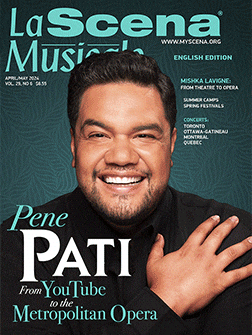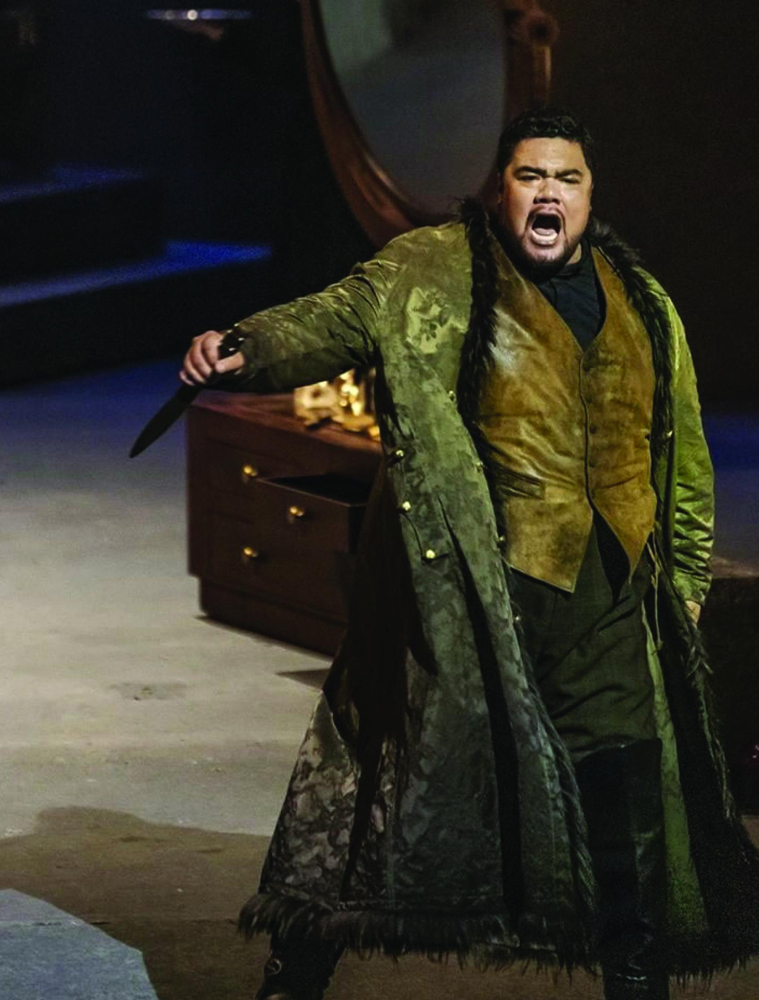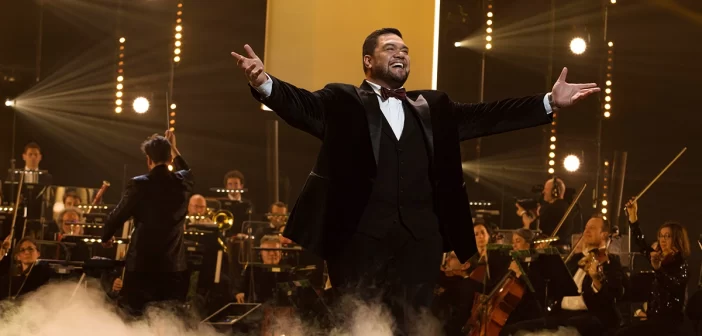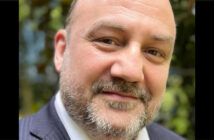
This page is also available in / Cette page est également disponible en:
![]() Francais (French)
Francais (French)
Pene Pati made time to sit down with La Scena Musicale while in Bordeaux, France, set to perform a concert at the Opéra national de Bordeaux the following day. It seems like a fitting set of modern circumstances, to interview the 36-year-old Samoan tenor, widely hailed as one of the contemporary stars of the opera world, over Zoom. His musical journey began by studying famous singers on YouTube: he has since attained international stardom himself—a trajectory that points toward a new era in classical singing.
Pati’s career has been meteoric, and recent seasons have seen him make numerous acclaimed debuts, including singing the role of Nemorino in L’elisir d’amore at Opéra National de Paris; Roméo in Roméo et Juliette at San Francisco Opera, Opéra Comique and Opéra National de Bordeaux; Alfredo in La traviata at Staatsoper Berlin, Dutch National Opera and Bolshoi Theatre; des Grieux in Manon at Gran Teatre del Liceu; Edgardo in Lucia di Lammermoor at Teatro San Carlo di Napoli; Percy in Anna Bolena at Wiener Staatsoper; and Duca in Rigoletto, to name only a few.
YouTube Lessons

Pene Pati (Photo by Simon Fowler and Parlophone Records)
Early in his career, Pati couldn’t afford to take voice lessons. Thanks to YouTube, the young singer had access to thousands of performances and masterclasses by Pavarotti on video. “I was a bit self-aware about practising, so I would just drive down to a park nearby and sit in the car watching and listening to him, and I would try to imitate him,” he said.
Pati spent hours carefully observing the videos for any gestural hints that could give him an idea of what the maestro was doing in order to produce his sound. The idea was not only to imitate, but also to understand Pavarotti’s technique. Pati was able to grasp a sort of switch (or flip) in his voice around his passagio area, and could clearly hear the change in vocal colour and vowel modification that occurred in that vocal range.
He explained that he was lucky to have looked to Pavarotti as a model—he could have turned to a bass voice type, and tried to produce a sound that was misaligned with his instrument. He pointed out that his tactic was not without risks, and warns singers about trying to learn through recordings and videos. He acknowledges the wealth of misinformation available online. It is easy, he said, for someone who doesn’t have enough knowledge of singing to go down the wrong path.

Pene Pati and Anna Bolena (Photo by Wiener Staatsoper, Michael Poehn)
“With social media culture today, everyone is an expert and is ready to give advice—‘Don’t sing like this because Franco Corelli did the opposite’, ‘Don’t sing like that because Nicolai Gedda did that.’ The important thing is to follow your intuition and be attuned to your senses. Know yourself!”
Regardless of his current industry status, Pati believes that his constant desire to learn and improve is what has allowed him to further develop his technique and craft, bringing him to where he is today. “Instead of concentrating on my shortcomings, I have been driven by the fact that I had nothing,” he said. “I saw other young colleagues going to Juilliard and thought ‘Wow! Wouldn’t it be nice to study voice there?’ I had no money for that, though, so instead I thought: How can I achieve good results with what I’ve got?”
A Blessing and a Curse

Pene Pati (Photo by Maitetxu Etcheverria)
“Man, you sound just like Pavarotti”! This is a phrase to which the Samoan tenor has grown accustomed. Pati’s Italianate timbre and early career successes in Rigoletto and other bel canto roles have earned him the comparison, and rightfully so. However, the similarities go beyond the voice: his larger-than-life personality and charismatic smile further inspire comparisons to Luciano.
According to Pati, the comparison has been both a blessing and a curse. He feels honoured to be compared to the opera legend, but noted that the comparison comes with a great deal of pressure. “I was super aware of it when I started, and would even lose sleep trying to live up to the expectation. Recently, I’ve accepted that I can only be myself, and the best I can do is polish my talent every day and put my best foot forward. Who knows? Maybe someday a tenor in the future will be told: Man, you sound just like Pene Pati!”
Trial by Fire
Having won several international opera competitions, Pati reached a turning point in his career when he performed the role of Duca di Mantova in Rigoletto in 2017, during his last year as a student at the San Francisco Opera’s Adler Program, a training program for emerging opera artists. Singers at the very beginning of their careers are rarely given the opportunity to perform a primo uomo—particularly one of such difficulty—but his teachers at the SFO trusted his ability.
“Singing the Duke—for anyone—is horrendously difficult,” said Pati. “It (the vocal line) sits high all night, you don’t have time to even breathe, and he barely comes off the stage. I was still a young artist, so when they told me they wanted me to sing the Duke, I couldn’t believe it. I assumed they must have meant that they wanted me to cover the role. I was incredulous; I think I made them repeat the phrase five times!”
Today, Il Duca de Mantova is an oft-sung part of Pati’s repertoire. In fact, he will be making his Metropolitan Opera debut in this very role, in January 2025.

Pene Pati (Photo by Simon Fowler and Parlophone Records)
Pati made his operatic Canadian debut with the Canadian Opera Company (COC) in 2023, singing the role of Rodolfo in La Bohème. This was his second time performing the role. “I had only sung it once before in France at Théâtre des Champs-Élysées,” he said. “I was very impressed by conductor Jordan de Souza. I had learned the role around 2011, but I was waiting for the right moment to do it—the moment that felt right for my voice.” Pati continued: “The sense that your technique feels reliable is important to taking on any role. I see some singers base their decisions on intuition and what their heart wishes to sing. That’s a fine in a way, too; however, I choose to approach these choices from the business and longevity point of view.”
Pati knew that after he had premièred the role, he would get a lot of requests for it. He put it quite simply: “The question became: Can I sing Rodolfo a hundred times, and can I maintain a good quality and good vocal health while doing it? One of the problems with lyrical roles such as Rodolfo is that a singer can get overly passionate and end up pushing his voice. We should never confuse passion with pushing the voice—but that’s easier said than done, of course.”
Pati notes other examples of such lyric romantic—but dramatic—roles: Don José and Des Grieux in Manon, for example. Carmen’s Don José goes from a lyrical bel canto sound to something that is far more dramatic by the end of the opera. “I feel sorry for young tenors who are not well informed, and start singing (Des Grieux’s) ‘En fermant les yeux,’ forgetting that later in the opera they have to sing ‘Ah, Fuyez!’—one of the most difficult and dramatic French arias!”
A Meaningful Recital
“I’ve done so many concerts where people just want to hear the favourites: Tosti songs, arias such as ‘Nessun Dorma,’ et cetera,” Pati said. “As an Adler fellow, I went to see baritone Dmitri Hvorostovsky perform one of his last recitals. He sang all Russian songs, that virtually nobody knew. We were all thinking: ‘Why doesn’t he sing the big hits (such as) ‘Credo in un dio’ from Othello?’ In retrospect, I understood and was able to fully appreciate that recital. His program was so well curated.”

Pene Pati (Photo by Simon Fowler and Parlophone Records)
Pati reflected on the Russian singer’s choice of repertoire: “It’s like he knew the end was near, and wanted to pay tribute to his roots.” Pati himself expressed gratitude for witnessing this special concert, which has inspired him to include more of his own roots and culture in his own concerts.
“I have curated a recital concert that means something to me as a person, not just as an opera singer,” he said. “I want to entice people to discover my culture. I will be singing some Samoan songs accompanied by guitar, and I’m singing some folkloric New Zealand songs with my wife, Amina. It’s very moving for me to interpret these songs abroad.” A nostalgic feeling seemed to overcome Pati as he reflected, in Bordeaux, on how much he misses his home country, his people, his family. By singing the New Zealand folk songs, he brings his home country with him on his travels, acting as a cultural as well as an operatic minstrel.
“I like to think that I’m a good example for up-and-coming Samoan singers,” he said. “When I started, no one was interested in opera. Currently, the pool of talent is so big that I don’t think I would stand a chance. They have since even built an opera house!”
Pene Pati will be singing in recital alongside his wife, soprano Amina Edris, and pianist Robert Mollicone on April 18 at Palais Montcalm, in Quebec City.
www.clubmusicaldequebec.com
Playlist
This page is also available in / Cette page est également disponible en:
![]() Francais (French)
Francais (French)















